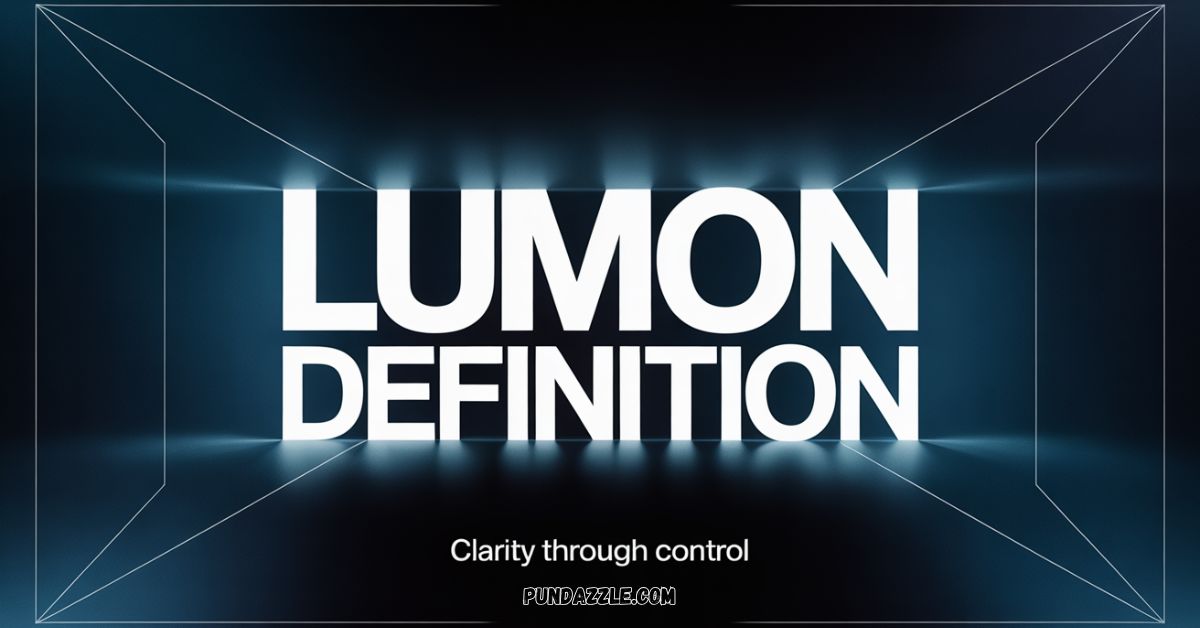Understanding the term Lumon is essential in today’s rapidly evolving language. Whether you encounter it in corporate settings, pop culture, or everyday conversations, its impact is undeniable.
This article explores the Lumon definition, its meaning, and its various implications in text, language, and usage.
Origin and Etymology of “Lumon”
To truly grasp the essence of Lumon, we must delve into its origin. The term derives from the Latin root “lumen,” meaning light or illumination.
The suffix “-on” often implies a technological or futuristic connotation, giving Lumon a modern twist. Thus, when you define Lumon, you’re not just talking about a word; you’re referencing a blend of light and advanced technology.
| Etymological Component | Meaning |
|---|---|
| Lumen | Light, illumination |
| -on | Technological, futuristic |
This combination evokes a sense of brilliance and clarity, which fits well in both corporate and creative contexts.
What Does “Lumon” Mean in Modern Usage?
In contemporary language, the meaning of Lumon can vary significantly based on context. Here are some prevalent interpretations:
- Corporate Branding: In business environments, Lumon often denotes a sleek, professional aesthetic. It embodies a polished, robotic tone that appeals to modern corporate culture.
- Fictional Universes: The term gained popularity through the Apple TV+ series Severance, where Lumon Industries represents a fictional corporation with a dystopian undertone. Here, it symbolizes a cold, corporate ethos that contrasts with human warmth.
- Digital Slang: In informal settings, Lumon might be used to describe anything that feels overly engineered or devoid of emotion, often in a humorous or critical tone.
In these contexts, Lumon can convey a spectrum of meanings, from professional brilliance to dystopian imagery.
Cultural and Symbolic Associations
Lumon resonates deeply with various cultural and symbolic elements. Its associations include:
- Illumination: The idea of enlightenment or clarity is central. For example, one might say, “She radiated Lumon energy,” suggesting a sense of brightness and insight.
- Corporate Dystopia: In the realm of fiction, particularly in Severance, Lumon symbolizes the extremes of corporate culture, where human elements are stripped away in favor of efficiency.
- Futuristic Language: The term evokes a sense of forward-thinking and innovation, often linked to technology and synthetic environments.
This multifaceted nature of Lumon allows it to fit seamlessly into various discussions about modern life, branding, and societal structures.
Also read: Maximize Your Vezgieclaptezims Signup Bonus Today
Connotations and Tone of “Lumon”
The tone of Lumon can shift dramatically based on its usage. Here’s a breakdown of its connotations:
| Connotation Spectrum | Positive | Negative | Neutral |
|---|---|---|---|
| Lumon | Enlightenment, clarity, futuristic glow | Robotic, cold, dystopian, cult-like | Professional, sleek, corporate |
When we explore the tone of Lumon, it often embodies a polished, ultra-professional feel. However, it can also evoke negative feelings associated with cold professionalism and ideological devotion.
For example, in creative writing, a Lumon mindset might reflect a character’s struggle against a rigid corporate structure.
Polite and Professional Alternatives
When seeking to express similar ideas without using Lumon, consider these alternatives:
- Illuminated: This word captures the essence of light and clarity without the corporate undertones.
- Radiant: A more positive term that emphasizes warmth and brilliance.
- Sleek: This term conveys a polished, professional aesthetic, suitable for branding.
Here’s a quick reference table for when to use these alternatives:
| Term | Use Case |
|---|---|
| Lumon | Corporate branding, modern contexts |
| Illuminated | Artistic, spiritual, or enlightening discussions |
| Radiant | Personal qualities, warmth, positivity |
| Sleek | Design, aesthetics, professional settings |
Choosing the right term can enhance your communication, ensuring it aligns with the desired tone.
When to Use “Lumon”
Lumon fits well in several contexts, particularly:
- Corporate Settings: Use it to describe branding or a product that embodies a modern, polished aesthetic.
- Pop Culture Discussions: Mention it when discussing Severance or other media where Lumon plays a significant role.
- Creative Writing: Incorporate it in works that explore themes of corporate culture, technology, or dystopian realities.
Example Usage
- “The presentation had a distinctly Lumon feel, emphasizing clarity and professionalism.”
- “In the world of Severance, Lumon serves as a stark reminder of the coldness of corporate life.”
When Not to Use “Lumon”
Conversely, there are situations where Lumon might be inappropriate:
- Casual Conversations: It may sound overly formal or pretentious in everyday dialogue.
- Personal Contexts: Avoid using it when discussing personal attributes or emotional states, as it lacks warmth.
- Artistic Discussions: In creative settings focused on genuine emotion, Lumon can appear robotic.
By understanding these contexts, you can communicate more effectively and avoid potential misunderstandings.
Also read: General News Logicalshout: Leading The Future Of Journalism
Practical Examples of “Lumon” in Context
To illustrate how Lumon operates within language, let’s consider some examples across different settings:
- Corporate: “Our new office design embodies a Lumon aesthetic, combining sleek lines with cutting-edge technology.”
- Fictional: “In Severance, Lumon Industries epitomizes the dangers of a corporate mindset stripped of humanity.”
- Everyday: “That new app has a Lumon feel, making everything seem efficient yet a bit cold.”
These examples highlight how the meaning of Lumon shifts depending on context, demonstrating its versatility.
Comparisons With Similar Words
To further understand Lumon, it’s helpful to compare it with similar terms:
| Related Term | Distinction |
|---|---|
| Luminous | Refers to a natural, warm glow; lacks the dystopian connotation |
| Lumen | A scientific unit of brightness; more technical |
| Luminosity | Relates to radiance without the ideologies linked to Lumon |
| Xenon / Lexon | Futuristic-sounding but does not carry ideological weight |
These distinctions clarify why Lumon holds a unique place in modern language, blending light with corporate and technological themes.
Final Thoughts
In conclusion, the term Lumon encapsulates a rich tapestry of meanings and connotations that reflect our contemporary culture.
Whether you encounter it in corporate branding, popular media like Severance, or casual conversations, understanding its nuances can enhance your communication.
As language evolves, so does our use of terms like Lumon. By embracing its multifaceted nature, we can navigate modern discourse with clarity and insight.
So the next time you hear or use Lumon, remember the depth it represents not just a word, but a reflection of our world’s complexities.
By exploring the Lumon definition, its meaning, and its various contexts, you gain a deeper appreciation for how language shapes our understanding of the world around us. Keep this guide handy as you encounter Lumon in text, language, and daily usage!
FAQs
What is the Lumon Definition in Modern Language?
The Lumon definition in modern language refers to a term that embodies a sleek, corporate aesthetic often associated with professionalism and technological advancement. It also carries connotations from popular culture, particularly from the Apple TV+ series Severance.
How Can I Understand the Meaning of Lumon?
To grasp the meaning of Lumon, consider its roots in the Latin word “lumen,” which signifies light and illumination. This duality allows Lumon to represent both clarity and a cold, corporate tone, depending on the context.
What Are the Key Aspects of Lumon Usage?
Lumon usage varies across different contexts, including corporate settings, creative writing, and casual conversations. Understanding when and how to use Lumon can enhance communication and ensure appropriateness.
What is the Origin of the Term Lumon?
The origin of Lumon traces back to the Latin root “lumen,” meaning light, combined with the suffix “-on,” which suggests a futuristic tone. This etymology gives Lumon its unique blend of illumination and technology.
How Does Lumon Contrast with Other Similar Terms?
When you compare Lumon to similar terms like luminous or luminosity, you’ll find that Lumon has a more corporate and dystopian connotation, making it distinct in its application and tone within modern language.
Read more knowledgeable blogs on Pun Dazzle

Philipp Engel is a passionate writer and pun lover dedicated to spreading laughter and joy through words. As the creator and author of the website Philipp Engel, he delivers a delightful mix of puns, jokes, and playful humor that entertains readers of all ages. With a sharp wit and a deep love for language, Philipp aims to brighten every visitor’s day with clever wordplay and a smile, making humor a universal language that connects people everywhere.








